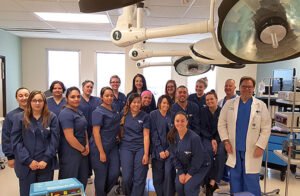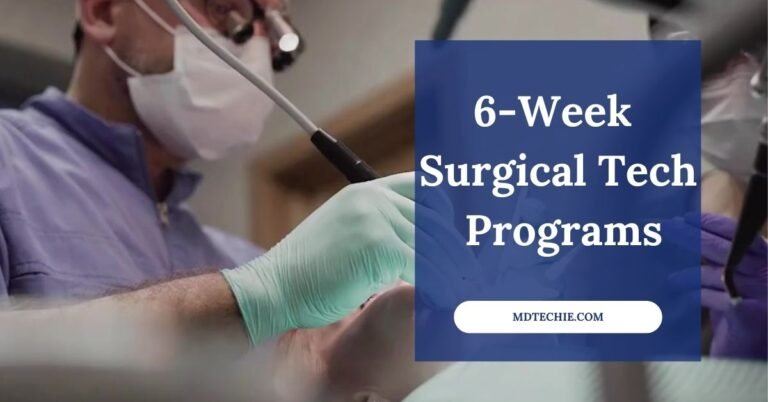6-Week Surgical Tech Programs
Many aspiring healthcare professionals find themselves drawn to the rapidly growing field of surgical technology, and a 6-week surgical tech program can be an excellent pathway to achieving this goal.
These intensive programs are designed to provide you with the core skills and knowledge needed to assist in surgical procedures effectively and efficiently.
In this post, you will discover vital information about the structure, benefits, and potential challenges of these programs, ensuring you make an informed decision about your future in the healthcare workforce.
Understanding Surgical Technology

As a surgical technologist, you play a crucial role in the operating room, assisting surgeons and medical staff during procedures. Your responsibilities include preparing surgical instruments, maintaining sterile environments, and ensuring everything runs smoothly throughout the operation.
With a 6-week surgical tech program, you can fast-track your way into this vital position, ready to support life-saving treatments in a matter of weeks.
Importance of Surgical Techs in Healthcare
Surgical techs are integral to the healthcare system, providing pivotal support that directly impacts patient outcomes. You ensure patient safety and efficiency in the surgical process, acting as the bridge between the surgical team and patient needs.
This role is increasingly vital in today’s healthcare environment, where specialized surgical procedures require precision and a reliable team. Skilled surgical technologists help minimize the risk of infection, maintain the availability of necessary instruments, and facilitate communication within the operating room, ultimately contributing to better surgery results and patient recovery times.
Skills Required for Success in Surgical Technology
Understanding the skills needed for success as a surgical technologist is vital for your journey. You’ll need strong attention to detail, the ability to work under pressure, and effective communication skills to thrive in this fast-paced environment. Surgical professionals must also possess a solid foundation in anatomy, medical terminology, and surgical procedures.
By honing these skills, you will be well-prepared to handle the challenges of the operating room and ensure the safety of patients, which is critical in this high-stakes field. A 6-week program will not only teach you these competencies but also instill the confidence needed to perform in a healthcare setting.
Top 6-Week Surgical Tech Programs for 2024
As the demand for skilled surgical technicians continues to rise, several educational institutions are offering accelerated programs to meet this need. For those aiming to enter the field of surgical technology quickly and effectively, a 6-week program can provide the essential skills and knowledge required.
Here’s a look at some of the top 6-week surgical tech programs for 2024:
College of Eastern Idaho

The College of Eastern Idaho offers a streamlined Surgical Technology AAS program divided into general education prerequisites and core surgical tech coursework.
The professional component includes 34 credits with courses such as “Operating Room Techniques I & II” and “Pharmacology for Surgical Technologists.”
Students complete over 500 clinical hours and attend classes Monday through Friday, with some coursework available online. Admission requires completion of general education prerequisites with a minimum grade of “C+” and preference is given to those with a Central Sterile Processing background.
John Wood Community College

John Wood Community College’s program is offered in partnership with Blessing-Rieman College of Nursing and Health Sciences. The curriculum includes 29 credits of specialized surgical tech courses like “Professional Issues for the Surgical Technologist” and hands-on training at Blessing Hospital and other facilities.
The program is noted for its high student scores on the Association of Surgical Technologists’ Program Assessment Exam. It typically takes three semesters to complete the surgical tech coursework, with additional time for general education requirements.
Baptist Health Sciences University

Baptist Health Sciences University provides a 67-credit Surgical Technology program with a blend of instructional courses, labs, and clinical practicums. The curriculum includes “Surgical Technology I & II” and “Pharmacology and Anesthesia.”
Students complete clinical rotations at Baptist Memorial Hospital and other sites within a 90-mile radius. The program spans four trimesters, with nine general education courses required before applying to the Surgical Technology major.
West Virginia University at Parkersburg

The Associate of Applied Science degree in Surgical Technology involves simultaneous enrollment in general education and surgical tech courses.
The program includes coursework in “Introduction to Surgical Technology” and “Pathophysiology of the Surgical Patient,” with 360 clinical hours at local healthcare facilities.
The program takes four semesters to complete, and admission requires high school graduation or GED, passing the HESI A exam, and a minimum GPA of “C” in relevant coursework.
Central Technology Center

Central Technology Center offers a certificate in Surgical Technology through a fast-track program without general education courses. The curriculum covers 14 classes, including “Basic Sciences for Surgical Technology” and “Surgical Pharmacology.”
Clinical rotations are held at Stillwater Medical Center, and students must pass the ODCTE Competency Exam before national certification. The program duration is 10 months.
Chattahoochee Technical College

Chattahoochee Technical College’s Associate of Applied Science degree in Surgical Technology includes 70 credits, with 15 credits in general education. The program features courses such as “Principles of Surgical Technology” and extensive clinical rotations.
Students must complete a minimum of 120 surgical cases and spend three days a week in clinical settings. The program typically spans three semesters for occupational courses, with an additional semester for general education requirements. Admission requires a grade of “C” or higher in prerequisites and a score of 65 or higher on the ATI TEAS exam.
Comparison with Traditional Surgical Tech Programs
Training in a 6-week surgical tech program contrasts significantly with traditional, longer programs. The table below highlights the key differences you should consider when choosing your path:
Comparison of 6-Week and Traditional Programs
| Aspect | 6-Week Program | Traditional Program |
|---|---|---|
| Duration | 6 weeks | 6-24 months |
| Intensity | Highly accelerated | Standard pace |
| Focus | Essential skills and knowledge | Comprehensive in-depth training |
| Hands-On Experience | Limited practical exposure | Extensive clinical rotations |
Surgical technologist roles can vary widely, and while a 6-week program can launch you into the field quickly, it’s important to consider the depth of training you desire. If you prefer a more in-depth learning experience that allows you to explore multiple facets of surgical technology, a traditional program may be more suitable.
However, if your goal is to fast-track your entry into the healthcare workforce, a 6-week program could be the ideal choice for your aspirations.
Ideal Candidates for 6-Week Surgical Tech Programs

All aspiring surgical technologists need to consider whether a 6-week program aligns with their career goals and lifestyle. These accelerated programs are tailored for motivated individuals who can thrive in fast-paced learning environments. Let’s explore who might be best suited for this intensive training.
Career Changers
The transition into the surgical tech field can be a rewarding path for those seeking a new career. If you have a background in another industry, a 6-week program can provide the vital skills and knowledge you need to pivot into healthcare quickly.
Recent Graduates and Students
Changers looking for immediate career opportunities can benefit significantly from a 6-week surgical tech program. If you’ve recently graduated from high school or college, this fast-tracked approach immerses you in practical training with a focus on the vital skills required in the operating room.
Individuals Seeking Quick Employment in Healthcare
On the other hand, if you are eager to enter the healthcare workforce promptly, a 6-week program can be an advantageous choice. These programs quickly prepare you to meet the growing demand for skilled surgical technologists, allowing you to start your career sooner rather than later.
Plus, as the healthcare industry continues to expand, your swift entry into the workforce could put you ahead in a competitive job market. The skills you’ll gain in just six weeks can make you a valuable asset to healthcare teams, ready to assist in surgical procedures and patient care efficiently.
Advantages of Enrolling in a 6-Week Surgical Tech Program
Not only do 6-week surgical tech programs offer you the chance to enter a high-demand field quickly, but they also come with numerous advantages that cater to the needs of aspiring healthcare professionals.

Rapid Entry into the Healthcare Workforce
Week by week, you will immerse yourself in a dynamic curriculum that prepares you to assist in surgical settings almost immediately. This rapid pace helps you gain critical skills and knowledge faster than traditional programs, allowing you to start your career in surgical technology without the lengthy commitment often associated with healthcare training.
Cost-Effectiveness of Short-Term Training
Into today’s fast-paced world, affordability is a vital factor in educational choices. 6-week surgical tech programs generally cost less than longer diploma or degree courses, making them an attractive option for many students.
For instance, typical costs associated with lengthy training programs—like tuition, textbooks, and other fees—can quickly add up. By choosing a shorter program, you may not only save on tuition fees but also minimize other expenses like living costs and transportation, allowing you to start earning sooner. This financial efficiency is especially important for those looking to transition to the healthcare field without incurring significant debt.
Flexibility and Intensive Training Formats
Training that is both intensive and flexible means you can tailor your learning experience to fit your lifestyle. Many 6-week programs offer varied schedules and learning methods, accommodating working professionals or those with family responsibilities. Understanding the need for diverse learning formats, some programs may incorporate evening classes, online resources, and hands-on workshops.
This flexibility allows you to balance your education with personal commitments while still receiving a comprehensive education that prepares you for the demands of surgical technology. The intensive nature of these programs also ensures you retain and apply your training effectively, enhancing your skill set in a shortened time frame.
Challenges and Considerations
Now, as you consider enrolling in a 6-week surgical tech program, it’s necessary to understand the challenges and considerations associated with this intense learning experience.

Intensity and Fast-Paced Learning Environment
One key challenge you will face in a 6-week program is the intensity and fast-paced learning environment. With most curricula designed to be completed in a fraction of the time of traditional programs, you must be prepared to absorb a substantial amount of information very quickly.
Information Retention Challenges
An important consideration is the potential for information retention challenges. In such an accelerated program, the sheer volume of material can be overwhelming, making it difficult to retain crucial information that you will need in real-world surgical settings. A significant factor contributing to these retention challenges is the need to balance theoretical knowledge with practical skills.
You might find that, despite your dedication, the fast pace leaves little room for comprehensive understanding. To succeed, you should utilize effective study techniques and regularly review content to reinforce your learning and ensure you can apply your knowledge in a clinical environment.
Readiness for Certification Exams and Job Demands
Readiness for certification exams and job demands is another critical factor in your decision-making process. You’ll need to demonstrate not only your knowledge of surgical procedures but also your capability to perform in high-pressure situations upon completing the program.
Understanding the rigorous requirements of certification exams and the expectations of employers is vital for your success. The skills you acquire during the program will be put to the test in a clinical environment. To fully prepare, you should engage in all learning opportunities offered and seek out mentorship or additional resources to bolster your confidence and competence when entering the workforce.
Accreditation and Quality of Programs

Importance of Accreditation
Keep in mind that accreditation is crucial when selecting a 6-week surgical tech program. Accredited programs meet established standards of quality and rigor, ensuring that you receive a comprehensive education that is recognized by employers in the healthcare field.
Without proper accreditation, your certification may not hold value, impacting your job prospects after graduation.
Key Accreditation Bodies for Surgical Tech Programs
Programs are often evaluated and accredited by specific organizations that uphold educational standards in healthcare fields. For surgical technologists, key accreditation bodies include the Commission on Accreditation of Allied Health Education Programs (CAAHEP) and the Accrediting Bureau of Health Education Schools (ABHES). Being familiar with these organizations can help you make informed choices about your education.
Surgical programs accredited by CAAHEP or ABHES are recognized as meeting the necessary standards to prepare you for a career as a surgical technologist. These bodies assess institutions based on their curriculum, faculty qualifications, and success rates of graduates, ensuring that you are taught the vital skills required in the operating room. Look for programs accredited by these organizations to bolster your qualifications in the job market.
Evaluating Program Quality and Reputation
Bodies responsible for accreditation also influence your decision on program quality and reputation. It’s crucial to investigate a program’s standing within the healthcare community. Seek out programs with positive reviews, high graduation rates, and strong job placement statistics to enhance your likelihood of securing employment post-graduation.
Tech trends within the surgical field can change rapidly, so a reputable program will stay updated on current practices and technologies. Investigating alumni experiences and program outcomes can give you insights into the quality of education you can expect and help ensure your investment of time and resources is well placed. By prioritizing accreditation and program quality, you can significantly enhance your career prospects as a surgical technologist.
How to Choose the Right 6-Week Surgical Tech Program
For those considering a swift entry into the surgical technology field, choosing the right program is crucial for your future success. When evaluating your options, consider several key factors that can impact your education and career prospects.

Factors to Consider
One necessary step in your decision-making process is to assess the following factors:
- Accreditation status of the program
- Curriculum and course content
- Instructor qualifications and experience
- Job placement rates for graduates
- Availability of hands-on training and clinical placements
Any of these factors can significantly influence your educational experience and career opportunities.
Researching Programs Effectively
On your journey to find the ideal surgical tech program, it’s vital to conduct thorough research. Start by exploring various institutions, both online and in-person, that offer 6-week surgical tech programs.
With the rise in demand for skilled surgical technologists, many educational institutions are offering accelerated programs. Look for programs that have a strong reputation and positive reviews from graduates.
Utilize forums, social media, and educational websites to gather insights on different programs. Don’t hesitate to reach out to current students or alumni to ask about their experiences, as this can provide invaluable information you won’t find through formal channels alone.
Importance of Hands-On Training and Clinical Placements
Clinical training is a necessary aspect of any surgical tech program, especially a condensed one. The more hands-on experience you gain, the better prepared you will be to assist in real surgical settings.
Training that includes clinical placements allows you to apply your skills in a practical environment, which is invaluable for your development as a surgical technologist.
Programs that prioritize hands-on training can provide you with opportunities to work alongside seasoned professionals in hospitals or surgical centers.
This experience not only enhances your learning but also boosts your confidence and employability once you enter the job market.
Preparing for the Certification Exam

Despite the fast pace of a 6-week surgical tech program, you will need to prepare diligently for the certification exam to validate your skills and knowledge. This exam is crucial for establishing your credentials in the field, typically led by organizations like the National Board of Surgical Technology and Surgical Assisting (NBSTSA). Understanding the structure, requirements, and resources available can greatly enhance your chances of passing.
Certification Process
To become a certified surgical technologist, you must successfully complete your training program and pass the Certification Examination for Surgical Technologists (CST). This involves not only mastering surgical techniques but also understanding patient safety protocols, sterilization methods, and surgical instruments. Proper preparation and focus during your coursework will set you up for success at this stage.
Resources for Exam Preparation
With the right resources at your disposal, you can effectively prepare for the certification exam. Look for study guides, practice tests, and online courses specifically designed for surgical technologists. Additionally, consider joining peer study groups or forums to share insights and tips with fellow candidates.
It’s also beneficial to utilize multiple formats for studying, such as textbooks, interactive quizzes, and video tutorials. Engaging with diverse materials keeps your study sessions dynamic and can deepen your understanding of complex concepts. Many programs also offer access to practice exams, which can be invaluable for gauging your readiness.
Exam Success Tips
Exam success hinges on thorough preparation and strategic study techniques. Start with creating a study schedule that breaks down various topics over the weeks leading up to your exam date. Focus on key areas such as surgical anatomy, instruments, and assisting techniques. Here are some tips to keep in mind:
- Review all course materials and notes regularly.
- Take practice exams to familiarize yourself with the test format.
- Make flashcards for necessary vocabulary and procedures.
- Stay engaged in discussions and study groups.
Any one of these strategies can make a significant difference in your review process.
Tips for your exam day include getting a good night’s sleep prior to the test, arriving early to ensure you have ample time to settle in, and staying calm during the exam. Managing your time wisely during the test and keeping track of challenging questions can also help ensure you answer effectively. Consider these further strategies:
- Visualize successful outcomes before entering the exam room.
- Practice relaxation techniques to reduce anxiety.
- Read each question carefully to avoid misinterpretation.
Any one of these approaches can help to enhance your confidence and performance on test day.
Job Opportunities After Completing the Program

Many graduates of 6-week surgical tech programs find themselves entering a field that is rich with opportunities. These programs are tailored to prepare you for a variety of roles within the healthcare arena, particularly in surgical settings. Understanding the types of positions available can help you strategically plan your career path after graduation.
Types of Positions Available
- Surgical Technologist
- First Assistant
- Scrub Tech
- Instrument Technician
- Operating Room Assistant
After completing your training, you will be well-equipped for a range of roles that require the unique skill set of a surgical tech.
| Position | Work Environment |
| Surgical Technologist | Hospitals, surgical centers |
| First Assistant | Operating rooms |
| Scrub Tech | Operating theaters |
| Instrument Technician | Surgical instrument companies |
| Operating Room Assistant | Medical facilities |
Salary Expectations in the Field
The salary expectations for surgical technologists can vary significantly based on experience, location, and specific role. Generally, entry-level positions can expect to earn a competitive salary that reflects the demand for skilled professionals in this field.
With the growing need for surgical techs, your starting salary can range from $40,000 to $50,000 annually. As you gain experience and take on more responsibilities, your earnings can increase, making this a financially viable career path. Additionally, surgical technologists in specialized surgical fields may command even higher salaries.
Job Market Trends and Growth Projections
Positions in surgical technology are experiencing positive market trends, with a significant increase in demand expected in the near future. The short duration of programs means you can enter the workforce swiftly, aligning with the sector’s growth projections.
A recent report indicates that job opportunities for surgical technologists are anticipated to grow by around 7% over the next decade. This growth is attributed to advancements in surgical procedures and an aging population that require more surgical interventions. By completing a 6-week program, you position yourself well in a field that offers stability and advancement opportunities.
Continuing Education and Career Advancement

Unlike many careers where an entry-level position is sufficient, surgical technologists are encouraged to embrace ongoing education and career advancement to remain competitive in the healthcare field. The landscape of surgical technology is constantly evolving, which presents numerous opportunities for growth and specialization to meet the demands of modern medical practices.
Opportunities for Specialization
One way you can enhance your career as a surgical technologist is by pursuing specialized certifications. Areas such as orthopedics, cardiovascular, or pediatrics allow you to focus your skills and increase your value in the job market.
Importance of Lifelong Learning
Advancement in the field requires a commitment to lifelong learning. As medical technology and procedures advance, you will need to keep your skills relevant to provide high-quality patient care. This not only enhances your expertise but also opens new doors for career opportunities.
It is imperative to regularly engage in continuing education courses that update your knowledge and skills. Many employers favor candidates who have demonstrated their commitment to professional development.
Additionally, these learning opportunities often provide networking platforms that can be beneficial for career advancement. You may want to consider attending workshops, online courses, or industry conferences to stay informed about the latest advancements in surgical technology.
Advanced Certifications and Degrees in Surgical Technology
Certifications can significantly enhance your qualifications. To stay ahead, you might explore advanced certifications that can elevate your career prospects and expertise in specific surgical fields.
- Certified Surgical Technologist (CST)
- Certified First Assistant (CFA)
- Advanced Cardiac Life Support (ACLS)
Advanced Certification Options
| Certification | Description |
| CST | Validates your skills and knowledge as a surgical tech. |
| CFA | Allows you to assist surgeons during operations. |
| ACLS | Essential for emergency situations in surgical settings. |
Plus, many surgical technologists choose to pursue an associate or bachelor’s degree to further their education and enhance their career prospects. A higher degree can open up advanced roles within surgical departments or management positions.
- Associate degree in Surgical Technology
- Bachelor’s degree in health science
- Master’s degree in healthcare administration
Degree Options
| Degree | Benefits |
| Associate | Most common entry-level degree for surgical techs. |
| Bachelor’s | Opens doors to higher-level positions in healthcare. |
| Master’s | Prepare for leadership or specialized roles in healthcare. |
By actively engaging in continuing education and considering advanced certifications and degrees, you will position yourself for a successful and rewarding career as a surgical technologist.
Conclusion
Drawing together the insights from this guide, you now have a clear understanding of what 6-week surgical tech programs entail. These programs offer a fast track into the healthcare industry, equipping you with vital skills needed to assist in surgical settings. While they come with unique challenges, the potential for quick entry into a rewarding career is significant.
As you consider your options, weigh the benefits against your personal goals and learning style to determine if a 6-week program aligns with your aspirations in the surgical field.

Daniel E
Hey there! I’m Daniel E, your friendly tech guide. At MD Techie, I unravel tricky tech stuff, making it easy-peasy for both newbies and seasoned pros. Think of me as your decoder ring for all things geeky!” 🌟🔍🚀




